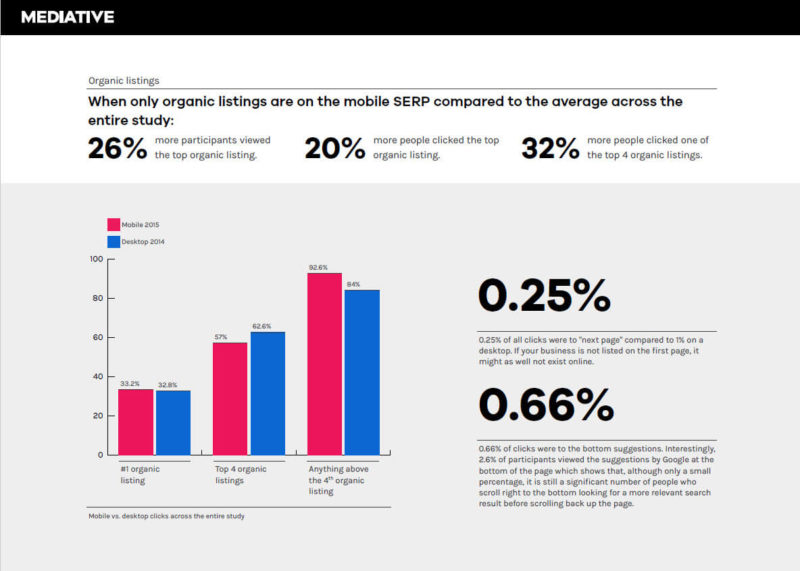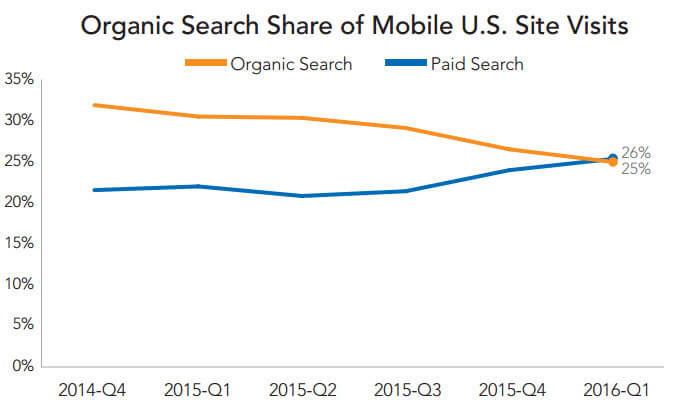5 reasons to keep doing mobile SEO even though ads are everywhere
Sure, paid search on mobile has grown. But if you're thinking of cutting your organic search budget for mobile, columnist Bryson Meunier urges you to reconsider and focus on increasing your overall traffic.

“Why would we continue to pay any attention to organic search on mobile when Google is only showing ads?” she says. “I just read a report from a prominent agency that said organic search visits were down seven percent year over year in Q1, as increased monetization of mobile results is pushing more traffic to paid listings, and that mobile traffic share has been flat for organic search in the past year, but it is up 10 points for paid search. Let’s just shift the budget into paid and be done with it.”
If you’re interested in growing your traffic overall, you should resist that suggestion.
While it’s true that organic search visits are down overall, according to recent reports, there are many reasons you should continue doing mobile SEO in 2016. Here are five of them.
1. The first organic listing in mobile still gets 73% more clicks than the first and second sponsored listings combined.
The first three points I’m going to mention come from research done last month by Mediative, a Montreal-based digital marketing agency and originator of the Golden Triangle study. Their white paper called “How do consumers conduct searches on Google using a mobile device?” is definitely worth downloading (registration required) if you’re interested in solid research on mobile search behavior.
And the bombshell from this report is that the lion’s share of mobile clicks goes to organic search results. The great majority of searchers all see the paid results, but most of them scroll past them to view the organic listings.
In fact, when you break it down, the top organic listing actually gets 73 percent more clicks than the top two paid listings together.

Source: Mediative (Click to enlarge.)
And the top organic listing gets more than twice as many clicks as the top sponsored listing.
The study also confirms that searchers click on organic results less when paid ads are present and that they’re present more on mobile than desktop. However, this doesn’t mean that paid search is the primary traffic driver on mobile. Only that it’s stronger than it used to be.
If you can only do one, you’ll usually get the most traffic on mobile from organic search. However, you get the most traffic when you do both paid and organic.
2. People mostly click on the top 4 organic listings in mobile, even more so than on desktop.
Another interesting thing about the recent Mediative study is that they compared the traffic to above-the-fold listings on mobile with the same on desktop and found that mobile searchers are much less likely to click anything beyond listing #4 in organic — likely because they have to make an effort to scroll to it. In fact, 92 percent of the clicks on the page go to the top four results on mobile, as opposed to 84 percent on desktop.

Source: Mediative (Click to enlarge.)
What this means is that it’s more important than ever to rank in the first four listings in organic if you want to get traffic from Google search. On page two, you’re still invisible to searchers, but even more so on mobile than desktop: 0.25 percent on mobile click to the next page, compared with one percent on desktop.
3. Organic search is more effective than paid in bringing non-brand traffic from mobile.
Merkle posted a chart in their most recent digital marketing report that shows paid search overtaking organic search as the top driver of mobile US site visits for their clients:
This and other trends do not bode well for organic search, causing Merkle to conclude that the culprit is “a result of Google’s increased monetization of the mobile search engine results page (SERP) and changes Google made in late 2015 to the display of its local pack map results.”
While this may be the case, it could also be because their clients are bidding on more general keywords, have increased their spend in paid search over a year, or both. It’s not necessarily something that should drive seasoned marketers in SEO to panic, especially because of the kind of traffic that is generally coming from paid search.
One of the reasons is that the traffic paid search drove in the Mediative study was mostly branded, with just eight percent of page clicks from non-brand queries going to paid search, compared with 56 percent from non-brand to organic.

Source: Mediative
Brand and non-brand queries are all part of the marketing funnel, and each can be valuable in its own way. But non-brand queries are historically the most competitive, since they’re relevant to multiple brands and represent a potential customer who is not yet brand-loyal.
And the biggest driver of these types of queries, according to the Mediative report? Mobile organic search results. Cut mobile SEO, and watch that valuable source of traffic diminish more than it already has.
4. Mobile SEO is about more than 10 blue links on a search result page.
Mediative’s study was largely about search result pages, but mobile SEOs can optimize apps for app store search engines, apps for search results and AMP (Accelerated Mobile Pages) results as well. Not to mention including structured data, local business listings and optimizing for featured snippets that can often help more in mobile than on desktop.
5. Mobile SEO works.
Unlike the agencies that put out studies like this, I am not trying to persuade you in hopes of getting your business. I’m in-house and not for hire. I’m just trying, like you, to put things in perspective. In my career, I’ve seen too many bad strategic decisions that were based on one data point without considering all of them.
The final point you should consider is that mobile SEO is effective. As I’ve mentioned before in this column, one reader was able to increase smartphone traffic by 84 percent after Google’s original mobile-friendly update, just by fixing mobile-friendly errors.
Paid search can be effective as well, and I think a great digital marketing campaign includes both paid search and SEO. But if you’re thinking about reducing your organic search budget for mobile because paid search on mobile has grown, please consider these five points before making a decision.
Opinions expressed in this article are those of the guest author and not necessarily MarTech. Staff authors are listed here.
Related stories
